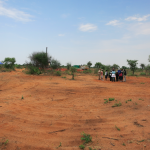Executive Training on Sustainable Investments in Agriculture
Date: June 15-25, 2021
Location: Online
Date: June 15-25, 2021
Location: Online
Une description en français est ci-dessous. Despite a recent transparency law and participation in transparency initiatives, Cameroon’s investment environment remains plagued by poor transparency. In a new report focusing on agribusiness projects in Cameroon, CCSI and the Centre pour l’Environnement et le Développement (CED) find that: Communities continue to be excluded from decision-making around investments…. read more
Transparency is often seen as a means of improving governance and accountability of investment, but its potential to do so is hindered by vague definitions and failures to focus on the needs of key local actors. In a new report focusing on agribusiness, forestry, and renewable energy projects (“land investments”), CCSI grounds transparency in the… read more
Date: October 13, 2020, 10:30am-12:00pm EST
Location: ONLINE

By Sam Szoke-Burke
September 18, 2020
Since last year, 35,000 people in Uganda’s Kiryandongo district were forced from their lands to make way for large-scale farming, including at gunpoint and by a sugar firm with international backing. Community members continue to be intimidated and tortured during a COVID-19 lockdown. The sugar industry is clearly still a long way from achieving sustainable and human rights-compliant sugar production.
In July 2020, CCSI made a formal submission to Bonsucro, an international multi-stakeholder initiative and certification scheme concerned with promoting sustainable sugar cane production. The submission formed part of consultations for Bonsucro’s draft Production Standard version 5. CCSI’s submission focused on challenges associated with implementing, and auditing for compliance with, three aspects of Bonsucro’s draft standard,… read more

June 15, 2020
In this profile, Mateusz Ciasnocha, Incubation Manager at AgriTech Hub VC, and a 2019 Executive Training alumnus, addresses his personal trajectory and what factors allowed him to get to where he is today, providing key advice to those interested in pursuing similar goals.
Investment approval processes are the gateway through which governments set the agenda for their country’s investment environment. Yet too often these processes fail to incorporate meaningful requirements regarding participation in decision-making by Indigenous and other affected communities, increasing the risk of under-performing and conflict-ridden investments. This briefing will explain how host governments can incorporate FPIC and meaningful consultation into each stage of the investment approval process.

By Sam Szoke-Burke
May 24, 2020
This briefing note presents our research into sustainability within the coffee sector, including the results of our analytical and empirical modeling, and provides several recommendations.